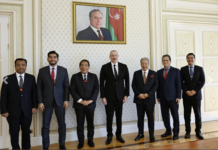KUALA LUMPUR, June 11 — “Vast experience and knowledge. The central bank is in good hands,” was the swift and assuring reply from Bank Muamalat Malaysia chief economist, Mohd Afzanizam Abdul Rashid, when asked about the change of guard at Bank Negara Malaysia (BNM).
The newly minted BNM governor, Datuk Shaik Abdul Rasheed Abdul Ghaffour, is not new to the statutory body. He joined the bank in 1988 and rose to the position of BNM deputy governor in 2016.
He is currently a member of the Monetary Policy Committee (MPC) and Financial Stability Committee, a position he had held since 2015.
Abdul Rasheed also played key roles in the development and implementation of the Financial Sector Masterplan and Financial Sector Blueprints.
He graduated from Universiti Malaya with a Bachelor of Economics and holds an MBA from the Saïd Business School, Oxford University.
“Abdul Rasheed has a fancied personality and is liked by many because of his openness to listen and accept opinions from others,” Mohd Afzanizam told Bernama in an interview.
All eyes on inflation
Malaysia’s inflation currently is not misbehaving, giving the central bank room to keep up its ‘conditional pause’, BNM assistant governor Fraziali Ismail told Bloomberg recently.
Nevertheless, Malaysia’s current inflation level would certainly be a key focus area for Abdul Rasheed, whose five-year term takes effect on July 1, 2023.
He will assume the position of governor from Tan Sri Nor Shamsiah Mohd Yunus, who completes her five-year term on June 30, 2023.
Market forces dictate that the new governor should strive to ensure that inflation is within an optimal range which could help promote the country’s economic growth without reducing the purchasing power of the currency.
Inflation is one of the top issues affecting the country as it could influence the movement of economic growth, as well as a key factor in determining the overnight policy rate (OPR) hike.
Will there be another OPR hike?
The central bank expects both headline and core inflation to moderate over the course of 2023, averaging between 2.8 per cent to 3.8 per cent.
Hence, upholding the role of BNM in promoting monetary and financial stability is equally important in providing a conducive environment for the sustainable growth of the economy.
Asked if there would be a change in the OPR with the new governor in place, Mohd Afzanizam, who is also Bank Muamalat social finance head, said the OPR should continue to be assessed based on the incoming data.
“Plus, the presence of two external members in the MPC will ensure the integrity of the governance structure and sound decision-making. So, policy continuity can be assured,” he explained.
BNM reduced the OPR to a record-low of 1.75 per cent in July 2020, to boost the country’s economy which had been badly hit by the COVID-19 pandemic.
It was maintained until May last year before the central bank increased the OPR five times (May 2022, July 2022, September 2022, November 2022 and May 2023) and each time by 25 basis points.
BNM’s latest hike brought OPR rates back to pre-COVID-19 levels of 3.00 per cent.
Ringgit and market forces
As for the impact on the ringgit, the economist said BNM has been consistent in their messaging that currency is not their policy tool.
“Intermittently, there will be market intervention by the BNM but merely to smoothen the currency fluctuation. In a nutshell, the ringgit will be determined by market forces,” said Mohd Afzanizam.
The ringgit is softening and stood at a 4.60 level against the US dollar, while the FBM KLCI dropped below the 1,400 level due to external and internal uncertainties.
As at June 9, 2023, the local currency ended at 4.6115/6160 versus the greenback.
Faith in the new BNM governor
Former BNM governor Tan Sri Muhammad Ibrahim acknowledged Abdul Rasheed’s appointment and believes that the new governor will do well in navigating the nation’s monetary and financial stability.
“He is the right and most suitable candidate. Abdul Rasheed’s strong work ethics, collaborative and inclusive approaches have served the bank and the country well,” he said.
Muhammad noted that the responsibility of a central banker is always challenging given the need to balance the interests of various stakeholders amid the increasingly challenging global financial and economic environment.
Meanwhile, Maybank group president and chief executive officer Datuk Khairussaleh Ramli said Abdul Rasheed had played key roles in developing high-impact financial blueprints to drive the nation’s economy.
“His extensive understanding of the domestic, regional and global economy is a huge advantage for our country, and we firmly believe that the banking industry will continue to thrive under his leadership,” said Khairussaleh, who is also the Association of Banks in Malaysia chairman.



















